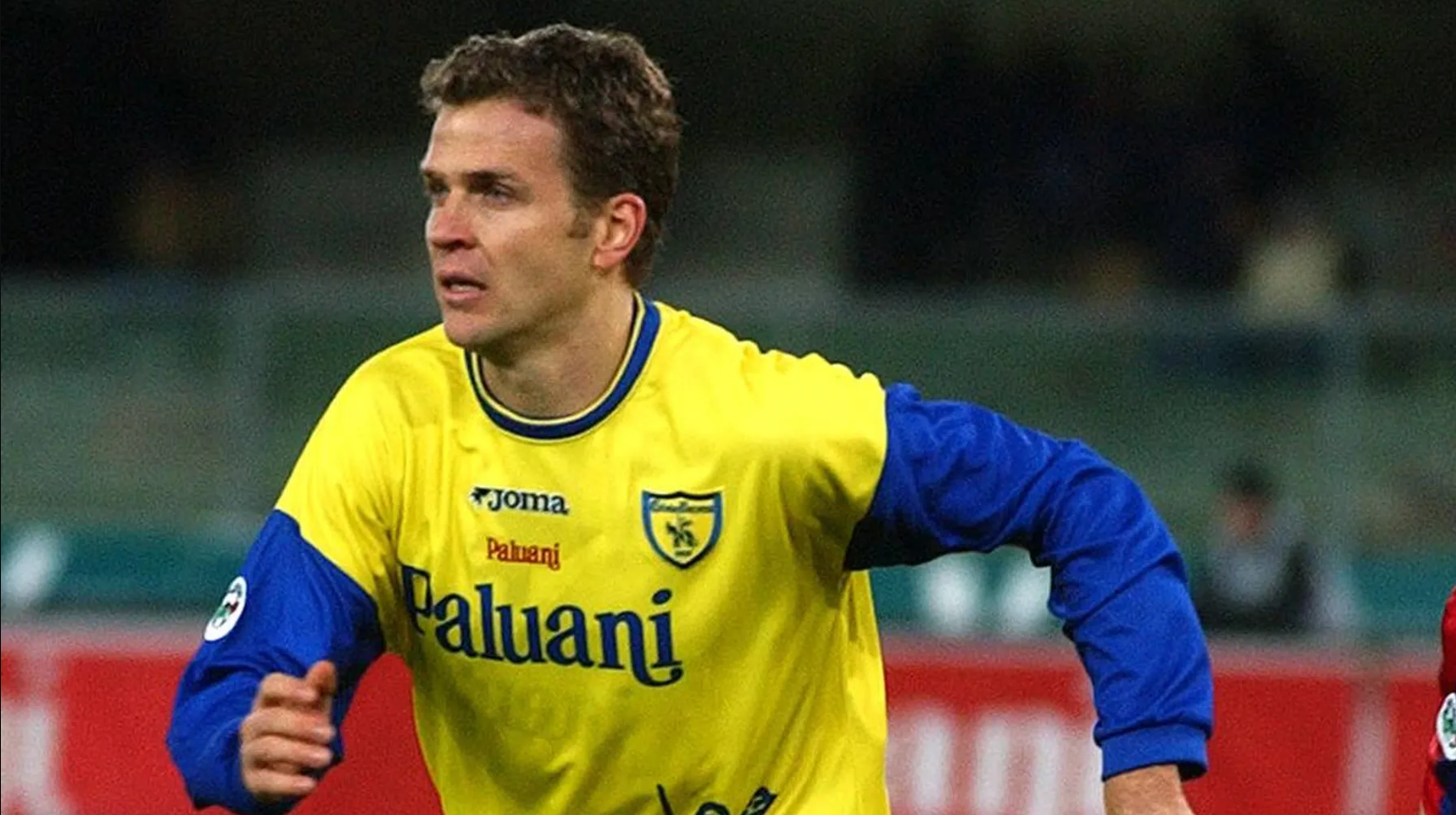Oliver Bierhoff and Chievo Verona’s short-lived spell together in Serie A was a perfect match. Bierhoff was an experienced German international in the twilight of his career. Simultaneously, Chievo was a team on the up and upsetting the status quo of Italy’s top-flight.
Bierhoff’s career was one of the sensational highs followed by general consistency. The towering German striker rose to international fame when he came off the bench and scored two goals to complete a comeback win against the Czech Republic in the Euro 1996 final.
Before then, he was a relatively unknown figure and the Euro ‘96 final heroics were reflective of the striker’s career. Generally, Bierhoff was an outside figure, never really excelling in elite football in Germany, unlike his German Euro 1996 teammates. While the likes of Jurgen Klinsmann, Christian Ziege, and Markus Babbel excelled at Bayern Munich in the 1990s, Bierhoff’s career took a less conventional path.
Bierhoff had unsuccessful spells at Bayer Uerdingen, Hamburger SV, and Borussia Mönchengladbach in his early days. He never really showed his true qualities and was never accepted in German football. Eventually, the striker was “laughed out of the Bundesliga” for his lack of ability.
But, the tenacious German eventually proved himself in Serie A. Bierhoff first joined Ascoli in Italy and he made over 100 appearances here as the club bounced between Serie A and B.
Then, Bierhoff’s strong three-year spell with Udinese led to a successful stint with Milan in the late 90s, where the German won the Scudetto in 1998/99. Bierhoff was also the third top scorer in Serie A that season, striking 20 goals.
The Rise of Chievo and Bierhoff’s Twilight
After Bierhoff left Milan in 2001, his footballing career appeared to be coming to a natural conclusion. However, a Chievo side that had just been promoted into Serie A, got into Europe and needed experience. As a result, the club came calling to give Bierhoff one last chance.
Chievo was an Italian team that plied their trade in the lower divisions until the early 2000s. However, their rapid spell of improvement saw them promoted to Serie A in 2001/02. To further defy expectations, the club finished fifth in their first-ever season in the Italian top flight.
The new boys were intent on challenging the Serie A giants and were seemingly eager to sustain their European aspirations in 2002/03. But Chievo needed experienced reinforcements to improve further.
At this time, Bierhoff retired from international football. He was part of the 2002 World Cup Germany squad that lost in the final to Brazil. The German was also without a club after he departed Monaco at the end of his contract. Bierhoff also pondered complete retirement from professional football.
Chievo, however, came knocking and offered Bierhoff a one-year contract in 2002. The club wanted Bierhoff for his decade of experience for Milan, Udinese, and Ascoli in the 90s. He was a well-suited target and accepted the offer for a final season in the Italian league.
The Bierhoff and Chievo Link Up
Immediately, the Bierhoff and Chievo transfer went exactly to plan. The German veteran led the line and scored in a 3-2 debut win at Lazio. Bierhoff continued to impress alongside strike partner Federico Cossato early in the season. Chievo were also on the rise again and won their first nine matches of the season, racing into European contention.
However, after a strong start and starting seven of his first eight matches at the club, Bierhoff’s impact began to decline. By January, Chievo were still going strong in Serie A. The club was in the European places, although, Bierhoff was in and out of the squad.
The beginning of the end almost came when Bierhoff was sent off in a 4-1 home loss against Juventus. He was then absent for two matches and struggled to get back into the team.
But, as the season came to its conclusion, Bierhoff ended his career in typical rollercoaster fashion. Despite not having started a match since early March, Bierhoff was given a starting appearance in the final game of the 2002/03 season. Chievo went to Juventus in seventh place and just out of reach of the European places.
Chievo started poorly and were 2-0 down with 30 minutes to play. Still on the pitch and sensing his last chance to shine, Bierhoff sensationally pulled one back before Juve netted again to make it 3-1. But Bierhoff was desperate to end on a high and scored twice in the final 15 minutes to seal his hat-trick and level the scores at 3-3. Eventually, Chievo couldn’t hold out for Bierhoff’s dream finale and they conceded with just three minutes remaining.
End of Two Eras
Ultimately, the Bierhoff and Chievo spell brought together two of Italian football’s cult identities. Bierhoff’s retirement brought an end to a career of proving the doubters wrong. After being rejected by the German footballing elite, the powerful striker found a footballing home in Serie A. The big German striker then forged an impressive career at the club and international levels.
Similarly, Chievo defied expectations in Serie A. The club burst onto the scene almost out of nowhere and stunned the traditional big clubs in the early 2000s.
Even after Bierhoff’s departure, Chievo continued to impress at the top level. The club was back in Europe for the 2006/07 season after a fourth-place Serie A finish in the previous campaign. However, like any cult team, Chievo declined following its dizzy peaks and was relegated in 2007 before the club eventually folded in 2021.
There were many similarities between the career of Bierhoff and Chievo’s rise and fall. Both displayed an ability to perform the occasional miracles as the underdogs. The player and the club were almost forgotten at times. But they both showed bright sparks to stay in the public eye. Neither were able to maintain longevity at the elite level. Although Bierhoff and Chievo gave fans moments that will be remembered for generations.

